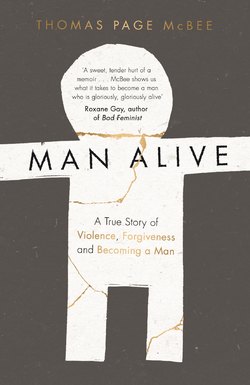Читать книгу Man Alive - Thomas Page McBee - Страница 12
На сайте Литреса книга снята с продажи.
Оглавление4
Pittsburgh
1990 ♦ 10 years old
“Your dad’s a bad man,” Mom said, studying herself in the bathroom mirror. I watched from the stairs of the walk-in closet, the light a sickly glow through the tightened blinds beside the tub. She was beautiful in an offbeat way: chunky purple necklaces, thin brown hair, infectious cackle. She applied her mysterious makeup, rouges and liners and then hair spray, a noxious cloud. She was a scientist used to being the only woman in a room, or on Air Force Two, briefing Ted Kennedy on structural physics; at General Electric, taking the wives out to dinner so they didn’t think she had designs on their husbands.
“He wants to apologize,” she told me, painting a purple on her eyelids the color of our summer sunsets in North Carolina. I felt myself disappear, thinking instead about upturned buckets of sand and crabs we’d caught ourselves for supper, dangling ropes strung with slimy turkey necks off the dock.
She turned to me and I made my face neutral. I hated her concern, and how much I wanted it.
I used to imagine a car accident when she’d leave for the grocery store and Dad would come for me. At her funeral, everyone would hold me gently while I cried. Feeling guilty at the memory, I watched her watch me, saw myself in her round cheeks and Slavic nose, but not the silky pleats of her dress or the wet mist of her Chanel bottle with the little black pump.
What I had were questions. Like: how could the distant, sleazy man who pressed himself against me then break through the weird blankness of his eyes to help me build a model engine that same night? Do we all have two people inside of us?
I mean, do I?
Mom stopped brushing her hair, and I felt the tremble in the room. If the story were up to me, she’d never cry. “I just want you to have a normal childhood,” she said, pulling me close, her breath minty, her belly warm, her fear in what she didn’t say, wouldn’t say but I knew it anyway: that she worried for me, that she stayed up at night convincing herself it wasn’t already too late.
♦
I could tell that Dad charmed people. Everyone gravitated to his lilting Southern accent, his aw-shucks smile and his good manners. He seemed youthful, refined, and so it was easy to overlook his silver halo, forget that he was in his fifties, way older than Mom.
But people can hold their true selves at bay for only so long—I knew that from Batman. Today, he looked worn out, exposed, waiting for us in the leather chair, his remaining hair unkempt, gray stubble crowding his face. His knuckles were thick, swollen as an old man’s, and he wore his exercise clothes: a gray tracksuit, coffee-stained.
He looked like the raggedy dog he’d once shot in the butt with a BB gun for crossing onto our property one too many times. “What are you doing?” Mom had said on the sunny porch that afternoon a few years before, her voice laced with alarm; maybe she’d never seen that side of him, but I knew it intimately, and how he’d look when he turned around, smiling that dumb, menacing smile. Of course one man can become another. Where two sides meet comes the potential for ghosts: dissonant smears, rips in the story.
“It was only his ass,” he’d said in that gentle accent, unloading the BBs carefully into his palm. “Just teaching him a lesson.”
The dog never did come back.
♦
Today he wasn’t that man or the model-engine one; he was even worse, in a way: more desperate, primal. “I’m very sorry,” he said, his head bowed.
We all faced each other like sacks of skin.
“My parents would’ve been so disappointed in me,” he added, oddly. There was a tremble in his voice. “I’m sorry to you, to them, to your mom.” He sniffed.
Somehow, I felt worse in the living room than I had the whole time he’d hurt me. Hurt, that’s what the therapist called it. All of these adults choosing the wrong words, missing the language, missing me.
When he wasn’t holding me down on a bed, I was hauling around the junky camcorder, dressing up the neighborhood kids and making horror movies with ketchup and bald-head caps. Or I was building a fort in the woods, a hiding spot with books and a flashlight, dried fruit, cookies.
What he did didn’t hurt. It disconnected, it made two of me like there were two of him. It made me a stranger to myself.
“I’m sorry,” he said. “You don’t deserve—”
I tried to figure out what he was apologizing for.
“I never meant—,” he said and leaned into his hands, choking on his own soggy snot.
Shut up shut up shut up, I thought. I gave him a look like he gave that dog, and he did.
